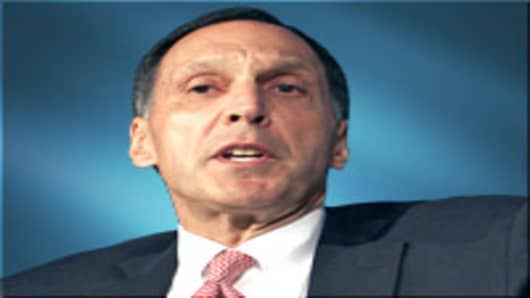Ten years ago, Dick Fuld brought Lehman Brothers back from the brink of disaster when the giant hedge fund Long Term Management imploded, squeezing Lehman's balance sheet.
Ever since, the Lehman CEO has earned the respect, confidence and—most of all—the trust of Lehman's employees who were proud to say they "bleed Lehman Green."
But those days are gone, vanishing in a few months of missteps by Fuld, once regarded as one of the best CEOs on Wall Street for building Lehman into a powerhouse investment bank with his tough, hands-on management styles.
Now, he is considered by Lehman's rank-and-file as a man who was either in denial about Lehman's problematic balance sheet—stuffed with billions of dollars of illiquid investments purchased under his watch—or a CEO who misled the troops to stay loyal and hold onto their stock even when it became that the company was doomed.
This assessment, of course, comes as Lehman is on the brink of extinction.
- Slideshow: See What Banks Failed This Year
- Financial Stocks Worth Buying (Really)
- Should You Dump Lehman & WaMu—Or Is It Too Late?
- Employees Worry About Jobs
- Lehman's Credibility in Question: Bove
- Bailouts May Push US Into Depression
- Farrell: We Need Write-Off Stability
Even in good times, such a rescue of Lehman would be difficult to pull off. In 1998, with dotcom underwritings pumping billions into Wall Street, the major securities firms agreed to bail out Long Term Capital out of fear that the market would implode because each had copied Long Term's soured trades.
Now Wall Street is suffering. The profit drought has squeezed balance sheets of all the big firms, even the most successful like JP Morgan and Goldman Sachs .
"We really don't have the money," said one person close to the Lehman bailout. "But the alternative is worse."
For all these reasons, Fuld, the ultimate insider, has seen his image trashed both among his peers at the big firms and among the rank and file Lehmaners who in just a few weeks seen their careers upended.
Fuld had been considered part of the Wall Street elite. He's member of the New York Federal Reserve Board. He's a close friend of John Mack, the head of Morgan Stanley, and has ties to many other top executives, such as former AIG chief Hank Greenberg and Larry Fink, the CEO of Blackrock.
Both of them agreed to provide Lehman with capital only a few months ago when the firm sought to calm investor fears by raising additional money for plug holes in its finances caused by the bad real estate debt.
But Fuld's actions were not enough. His stock continued to fall and his plan to add even more capital by selling off the company's asset management business was rejected by investors.
Now Fuld's friends in the executive suits are questioning his judgment: Why did he wait so long to raise money? And why did he buy much of the soured real estate at the height of the market as he did with one of the firm's biggest commercial real estate assets, the Archstone-Smith transaction?
And even bigger problem for Fuld's Wall Street buddies is whether he was being completely honest when he attacked critics of the company's balance sheet, namely short seller David Einhorn. Fuld's former CFO Erin Callen even began a media blitz earlier in the year saying that Lehman finances were strong and Einhorn's analysis was weak.
"Fuld was in the papers doing a victory dance when in reality the place was in desperate shape," said one executive at a major Wall Street firm.
The assessment among the Lehman executives is even worse. After 1998, when Fuld was credited with saving Lehman after the Long Term Capital debacle, Lehman executives bought into Fuld's corporate culture. Even administrative assistants agreed to stay with the firm that paid them as well as top executives, with much of their salary in company stock.
Fuld used to rev up the troops, telling them to "bleed Lehman Green," which was the color on company brochures and seen on the firm's headquarters in lower Manhattan.
Outsiders remarked that working at Lehman was like a cult—the firm epitomized Fuld's hard charging us-against-them attitude when competing with other firms, much like another now departed firm, Bear Stearns. But unlike Bear, Lehman was considered a top tier firm in investment banking and other high end businesses where it competed with white shoe outfits like Goldman and Morgan.
But in recent months, Lehman executives feel misled and some betrayed by Fuld and his senior management team, such as his long time No. 2 executive, former president Joe Gregory, who was demoted several months ago.
Management, according to several Lehman executives, continued to brush aside negative assessments of the firm's finances, extolling employees to stay with the firm rather than jump ship. Many executives refused to sell stock earlier in the year because of the word from senior management that the company was just fine.
At one point, management announced a plan to provide a mid year bonus of stock that can be purchased at around $20 a share. On Friday shares of Lehman closed closer to $3.
"There were people here who just a few weeks ago would go through hell for Dick Fuld," said one former Lehman executive. "That has changed. People want his head."
A spokeswoman for Lehman didn't return a telephone call for comment.
According to people close to the deliberations to sell Lehman, Fuld is no longer taking the lead in the negotiations. Most of the negotiations are being handled by his new No. 2, Bart McDade, these people say.


